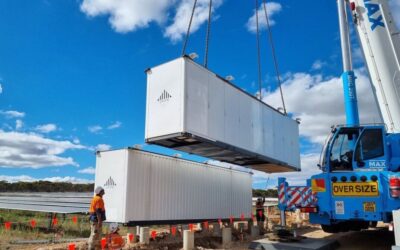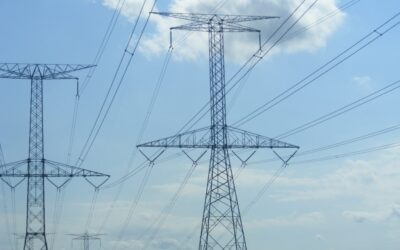Dale Vince of Ecotricity. The company will trial the deployment of 100 Black Box storage batteries for homes this year. Image: Ecotricity.
Ecotricity, a UK-based supplier of renewable and clean energy, will trial a home energy storage box later this year.
Ecotricity has confirmed that it will begin a 100-home trial of its ‘Black Box’ energy storage system later this year. The energy supplier’s founder and notable green entrepreneur, Dale Vince said that the company’s research project is being driven by the knowledge that energy storage will play a critical role in the country’s move to a low-carbon economy.
Enjoy 12 months of exclusive analysis
- Regular insight and analysis of the industry’s biggest developments
- In-depth interviews with the industry’s leading figures
- Annual digital subscription to the PV Tech Power journal
- Discounts on Solar Media’s portfolio of events, in-person and virtual
Or continue reading this article for free
Vince, who this week laid out his ‘vision’ to make Britain 80% renewable energy-powered by 2030, explained: “To get to a future where we are powered by renewable energy we need to develop a smart grid and storing energy is an important part of that.
“Often people talk about this needing to be done at a grid scale, but at Ecotricity we want to do this at a household scale, with a device we call the Black Box, which we’ve been working on for about three years now.”
Vince continued that Ecotricity has carried out “extensive modelling” of the UK’s current grid infrastructure to identify how energy storage can help shoulder the challenge of balancing variable energy sources.
The Black Box concept is a “device that takes houses on and off the grid at different times of the day to avoid the peaks, it’s really like taking cars off the road in the rush hour. This reduces the need for power stations on standby to hit those peaks of demand,” explained Vince.
The company has not yet revealed any details of the technology behind the device.
Vince has forecasted that the UK will derive 80% of its energy generation from renewable sources by 2030 as part of his ‘2030 Vision’ document, published this week. The document states Vince’s expectation that the UK will adhere to the Committee on Climate Change’s goal of decarbonising the UK’s energy sector within the next 15 years, hitting its target of 50 grams of CO2 per kilowatt hour.
Vince expects there to still be large-scale solar farms being constructed in the UK but believes the technology will really take off on rooftops, with distributed generation being the biggest market for solar in the UK.
“The document is intended to spur people’s imagination. Some of it might seem a stretch, some of it is actually easier than we think – but all of it is possible,” Vince said.
Ecotricity's Black Box. The image may not be inspiring, but Ecotricity founder Dale Vince hopes it will contribute to his vision of a greener Britain. Image: Ecotricity.
The Ecotricity boss said his vision would see every house in the UK have an energy storage device and described the technology as pivotal in the global attempt to decarbonise our energy generation.
“Nationally if every home had one, we’ve modelled that we’d save 15% of power station capacity, which is about the current nuclear contribution, which I think is very important,” he said.
“On top of that we can use it as an energy company to absorb wind energy when we’ve got too much and to give it back when we don’t have enough, so its a distributed way of dealing with this intermittency problem. And at the same time improve the load factor of the national grid and reduce the number of power stations we need to build and that are currently sat idle. It’s about efficiency, through technology.”
Also being trialled at the moment by the government’s Department of Energy and Climate Change (DECC) is the installation of 250 residential storage systems by another UK company, Moixa. Having won direct funding in a competitive bidding process, the company is trialling the benefits of connecting residential storage systems together, both to provide integration of renewables and to help protect the grid network.
After a rush of activity late last year that implied a residential storage boom was imminent, the UK and the solar energy industry in particular has found itself more preoccupied with fighting uncertainty over policy and regulations for large-scale solar and awaits long-promised activity in the commercial rooftop segment. Also as the UK faces the final stretch of its wait for a general election to take place this week, the current government has ruled out any immediate commitment to energy storage, while it has hardly been mentioned on the campaign trail.
Along with Ecotricity and Moixa, it appears many UK-based and international companies still believe opportunities will open up at both economic and environmental level for energy storage. One company making battery-based systems, Powervault, recently raised over £500,000 in a crowdfunding drive, while another company, Sunamp, which PV Tech Storage spoke to today, is banking on batteries that store heat rather than electricity. Citing the high volume of heat energy used in the UK as a compelling reason to look at their alternative, or perhaps complementary, technology to electricity storage systems such as that launched internationally by Tesla last week, Sunamp CEO Andrew Bissell said that the heat batteries are currently undergoing certification and testing and are nearing their readiness for launch.






